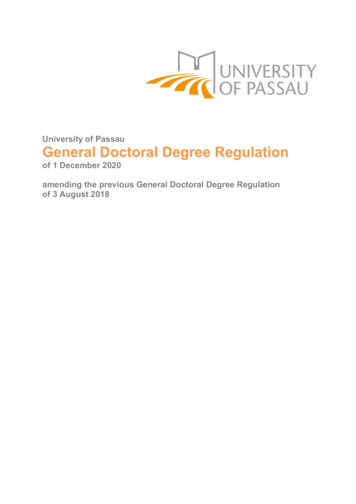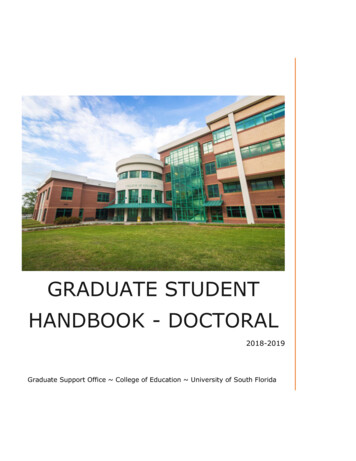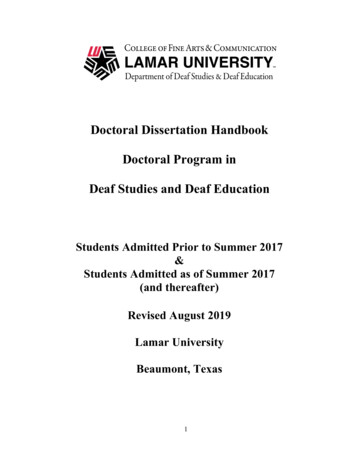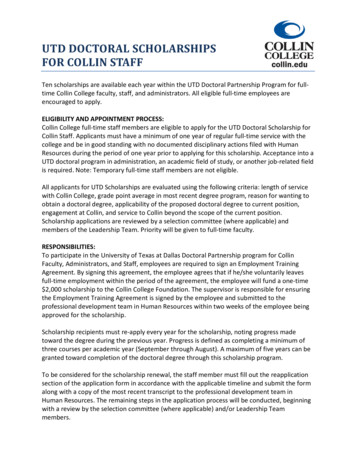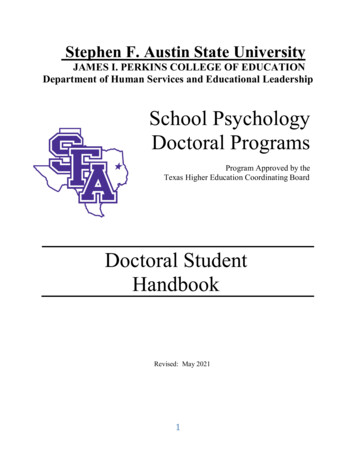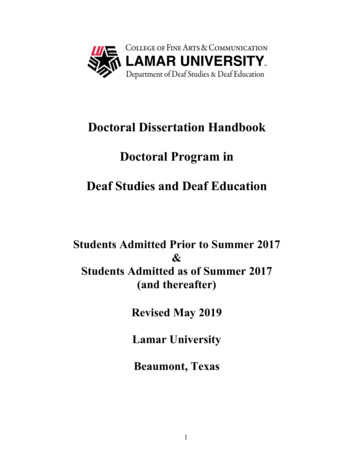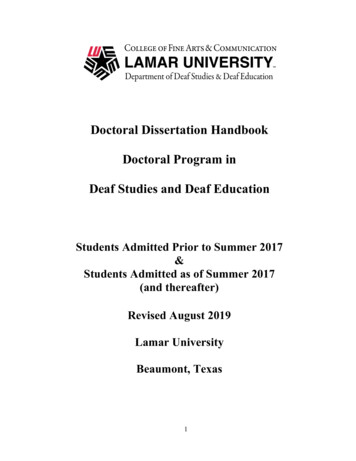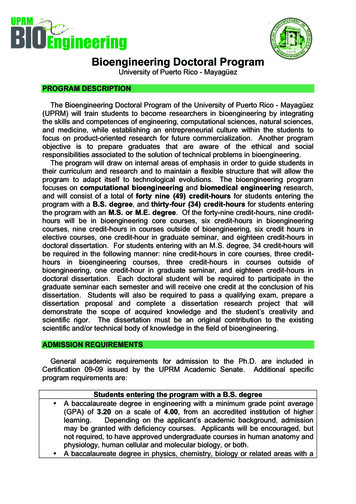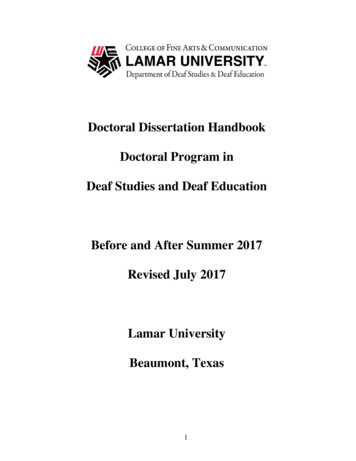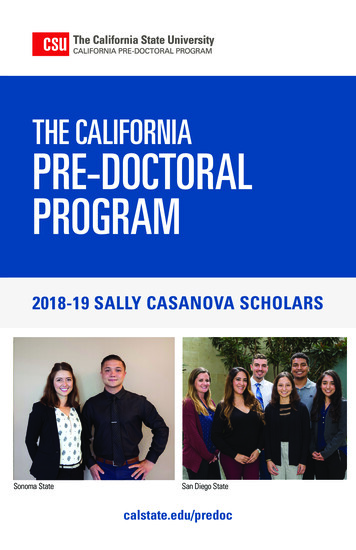
Transcription
THE CALIFORNIAPRE-DOCTORALPROGRAM2018-19 SALLY CASANOVA SCHOLARSSonoma StateSan Diego Statecalstate.edu/predoc
I AM A edoc
For the past 30 years, the California State University’s (CSU) Pre-DoctoralProgram has granted the Sally Casanova scholarship to over 2165 lowincome and educationally disadvantaged students throughout the CSU, themajority of whom are first-generation college students. For the 2018-19academic year, 72 new scholars will join this group representing 15 of the23 CSU campuses.The California Pre-Doctoral Program is designed to increase diversitywithin the pool of university faculty by supporting the doctoral aspirationsof students in the CSU—with particular support for low-income andeducationally disadvantaged students. Awardees of this scholarshiprepresent juniors, seniors, and master’s level students who come from avariety of academic disciplines. Each of these scholars are mentored by afaculty member from their respective campus.The scholarship provides the Sally Casanova Scholars with: An opportunity to travel with their mentor to various University ofCalifornia (UC) and other doctoral granting institutions for site visits; Attendance at national symposia, or professional meetings,exposing them to their field of interest; and Memberships in professional organizations, subscriptions toacademic journals, or Purchasing of supplies necessary to carry out their currentresearch agenda.In addition, these scholars are offered an opportunity to participate in asummer research experience at any doctoral granting institution in theUnited States, with particular emphasis on the UCs. This eight-week programgives the scholars direct exposure to doctoral-granting faculty and research,preparing them for entry into doctoral programs.This booklet provides an overview of the 72, 2018-19 Sally CasanovaScholars and their research interests.1
CSU Long BeachFresno StateCSU Fullerton2
San José StateCSU Dominguez HillsSan Francisco State3
Jesus AbarcaFaculty MentorDr. Jill L. QuiliciCampusCalifornia State University, NorthridgeE-mailjesus.abarca.545@my.csun.eduGrade LevelSeniorExpected Dateof GraduationSpring 2019MajorPsychologyDoctoral StudyField of InterestSocial SciencesJesus’ research interests are the mechanisms of language in underserved populations. Tocomprehend the complex processes involved in language, he is investigating mental processes,including perceiving, thinking, believing, problem solving, remembering, and decision making tofurther explain the importance of language. Jesus is interested in how immigrants who speaka foreign language are sometimes criticized for not speaking the dominant language. This cancause stress and anxiety that could hinder immigrants’ motivation to contribute or participatein their community. He hopes to create a project that intertwines language with solving difficultcognitive dilemmas. This could potentially demonstrate the need for an increase of immigrantswho can potentially participate in economic, political, and cognitive issues. Many issuestoday require complex problem solving, and a diversity of perspectives can contribute to thedevelopment of new solutions.Mariela Aguilar PerezFaculty MentorDr. Melanie McNeilCampusSan José State UniversityE-mailmaguilar1991@gmail.comGrade LevelMaster’s 3rd YearExpected Dateof GraduationFall 2018MajorChemical EngineeringDoctoral StudyField of InterestEngineeringMariela’s work utilizes biotechnology and chemical engineering to develop products and processesthat help improve human health and benefit the environment. Her most recent project focused onimproving cell culture media used to produce therapeutic monoclonal antibodies from Chinesehamster ovary cells. In fed-batch processes, media is an essential factor for cell growth and proteinquality. Different amino acids derivatives resulted in improved media stability and contribute toimproved cell viability. Her master’s project investigates alternative catalysts used for biodieselproduction that are cost-effective and environmentally friendly. It is difficult in commercialproduction to recover and reuse the highly alkaline catalyst currently used, resulting in hazardouswaste generation that requires further treatment for safe disposal. The development of lesshazardous catalysts with comparable activity, can help develop a safer and more cost-effectivebiodiesel production method.4
Cristina AlcarazFaculty MentorDr. Rachel MackelprangCampusCalifornia State University, ade LevelMaster’s 2nd YearExpected Dateof GraduationSpring 2019MajorBiologyDoctoral StudyField of InterestSciencesCristina is investigating the survival strategies employed by microbial communities residing inpermafrost. For her Masters’ thesis project, Cristina has chosen to focus on a particularly importantaspect of microbial community function, antibiotic resistance. Antibiotic resistance is ancient andoccurs naturally among soil-dwelling microbes. Antibiotic resistance genes are involved in communitysignaling, environmental sensing and play a role in competition and defense interactions. Themicrobial communities residing in permafrost exist in an environment that has never been exposedto synthetic antibiotics. This offers a unique opportunity to study antibiotic resistance strategiesunaltered by anthropogenic effects. Global warming is escalating temperatures in the Arctic causingwide-spread permafrost thaw, microbes that were once sequestered in ice will be integrated into theemerging ecosystem, making knowledge of their genetic potential essential.B. Gabriela ArangoFaculty MentorDr. Daniel E. CrockerCampusSonoma State UniversityE-mailarangob@sonoma.eduGrade LevelMaster’s 2nd YearExpected Dateof GraduationSpring 2019MajorBiologyDoctoral StudyField of InterestSciencesGabriela is an ocean lover and a scientist in training. Her main research interest is physiologicaladaptations for breath-hold diving, specifically those of sea turtles. Despite their delicatestatus—all of the seven extant species are currently listed in The IUCN Red List of ThreatenedSpecies—relatively little is known about their diving physiology. Currently, she studies the aerobicdive capacity of sea turtles, a critical feature in determining plasticity of foraging behavior and theability of individual turtles to respond to changes in prey distribution and ocean climate. Gabriela’sresearch also provides a starting point to create predictive models of predator-prey interactions andto understand how physiology constrains their diving behavior. With this information, scientists,conservationists, and policy-makers may improve ocean conservation efforts. To continue herresearch, she would like to merge genetics and physiology and compare the diving evolutionaryadaptations between mammals and reptiles.5
Daisy AvilaFaculty MentorDr. Xuan SantosCampusCalifornia State University San MarcosE-mailavila053@cougars.csusm.eduGrade LevelMaster’s 1st YearExpected Dateof GraduationSpring 2020MajorSociological PracticeDoctoral StudyField of InterestSocial SciencesDaisy’s research focuses on the lived experiences of formerly incarcerated folk and what are thestructural barriers they face when navigating social services. She seeks to explore how formerlyincarcerated persons are inadequately and unjustly acknowledged within institutions that pridethemselves on student success and diversity. Her graduate work aims to examine the everydaynessof re-entry students, who live in legally-mandated treatment centers and grassroots communitycenters. Daisy seeks to explore how they transform into resilient agents as they navigate theprocesses for seeking health, housing, educational, legal, and employment services in the stagesupon release. As a scholar her work seeks to inform public policy on [in]justice in the service sectorwork within institutions of higher learning. She is interested in exploring alternative resources andframeworks rooted in critical, popular education and prison-to-school frameworks.Inayah BaaqeeFaculty MentorDr. Jeff CookstonCampusSan Francisco State UniversityE-mailibaaqee@mail.sfsu.eduGrade LevelMaster’s 2nd YearExpected Dateof GraduationSpring 2019MajorDevelopmental PsychologyDoctoral StudyField of InterestSocial SciencesInayah is interested in studying the psychological outcomes associated with structural inequalityand oppression (i.e. discrimination and economic disadvantage). As a graduate student, she isexamining the developmental outcomes influenced by implicit bias in education. Stereotype threat,a psychosocial phenomenon, offers an explanation for the underperformance of underrepresentedminorities and occurs when the awareness of stereotypes and fear of confirming stereotypesinduce threat, which consequently undermines performance. Stereotype threat disproportionatelyimpacts individuals belonging to highly stereotyped groups (e.g. African-Americans, females inSTEM) who are especially susceptible to stereotype threat in academic environments. For hermaster’s research, she has developed an evidence-based intervention program for third-fifth gradeelementary school children intended to promote resilience to stereotype threat, implicit bias,and discrimination. The intervention program is one of the first of its kind to be administered toelementary school children and may influence structural innovation in primary-level education,especially for racial/ethnic minorities.6
Kelsey Patricia BairdFaculty MentorDr. Bob RobertsCampusCalifornia State University San MarcosE-mailkelseypbaird@gmail.comGrade LevelSeniorExpected Dateof GraduationSpring 2019MajorSociology, Critical Race TheoryDoctoral StudyField of InterestSocial SciencesKelsey Baird is investigating the social correlates of mental health/illness in resettled refugeecommunities—a group shown to be at elevated risk of developing severe mental health problems.Her specific focus is on how diagnosis and treatment norms in the U.S. and Canada are experiencedand understood by resettling refugees, their larger communities of origin and resettlement,and mental health professionals providing services. Her work explores how these experiencesshape and are shaped by dominant norms of diagnosis, categorization, and treatment. Kelseyhas presented her research internationally and is a 2018-2019 recipient of the Killam Fellowshipawarded by Fulbright Canada, enabling her to study and conduct research in Toronto in Spring 2019.Esteban BautistaFaculty MentorDr. Taeboem OhCampusCalifornia State University, NorthridgeE-mailebautista.elac@gmail.comGrade LevelSeniorExpected Dateof GraduationSpring 2020MajorBiochemistryDoctoral StudyField of InterestSciencesA molecular machine can be defined as “an assembly of a distinct number of molecular componentsthat are designed to perform machinelike movements (output) as a result of an appropriate externalstimulation (input)”. Broadly speaking, Esteban is interested in researching nanotechnology for thedevelopment and advancement of health through synthetic molecular machines. Interests includethe delivery of therapeutics and cells, attack of cancer cells, and increasing the functionality ofother molecular machines. With advancements in molecular machines, the field of nanomachineswill eventually evolve into nanorobotics. This entails advanced functions compared to theirnanomachine, rudimentary counterparts. Molecular machinery is still in its early stages and furtherdevelopments need to be made in order to increase their efficiency, speed, and capabilities.7
Katherine BernalFaculty MentorDr. Gitima SharmaCampusCalifornia State University, FresnoE-mailkeakate92@mail.fresnostate.eduGrade LevelMaster’s 2nd YearExpected Dateof GraduationSpring 2019MajorSchool CounselingDoctoral StudyField of InterestSocial SciencesKatherine’s research focuses on improving school counseling to increase equity and access toeducation for minority and underserved student populations. Her current investigation for herMaster’s thesis examines the barriers that undocumented Latino/a high school students face,which impact their educational success as they transition into higher education. It analyzes theactions of schools now and evaluates new ways of providing the proper resources to students. Theliterature is in dire need of assessing the tools that are currently available to school counselors inaiding undocumented students that are college-bound. More resources need to be made accessiblefor Latino/a undocumented students, so they have equal chances of completing their educationalaspirations. Through in-depth interviews of school counselors in the California Central Valleyarea, Katherine hopes to gain understanding of the social, emotional and academic difficultiesundocumented students experience and translate it into school counseling programs that can beimplemented throughout American high schools.Jewel BourneFaculty MentorDr. Dimpal JainCampusCalifornia State University, NorthridgeE-mailjewelbourne@ucla.eduGrade LevelMaster’s 2nd YearExpected Dateof GraduationSpring 2019MajorHigher Education Leadership ProgramDoctoral StudyField of InterestEducationJewel’s research focuses on the experiences of Black female-identifying students as they navigatethe community college transfer pipeline. In particular, she examines the racial transfer gap forBlack and African American women who transfer from community college to a baccalaureategranting institution. She aims to fill a gap in the literature through analyzing and documentingthe narratives of these women to provide research that is instructive for student services praxis.Jewel’s research is informed through her personal and practitioner experience with assistingunderserved transfer students in the Los Angeles area. As a future doctoral student, Jewel aims toexplore the intersections of race, gender and class in higher education and advance diversity andequity practices.8
Mariana BrunoFaculty MentorDr. Margie Brown-CoronelCampusCalifornia State University, FullertonE-mailmbruno@csu.fullerton.eduGrade LevelMaster’s 3rd YearExpected Dateof GraduationSpring 2019MajorHistoryDoctoral StudyField of InterestHumanitiesMariana’s research explores the diversity and resiliency of a historically multiethnic enclave in thecity of Santa Ana, known as Artesia Pilar, located in Orange County. This research employs an oralhistory methodology to collaborate with the community in reclaiming a historical narrative thatis inclusive of those left in the margins of history. Conducting oral histories with neighborhoodresidents offers a deeper understanding about the ways individuals give meaning to the placethey inhabit and create a community of possibilities. By utilizing community cultural wealth as aframework, Mariana’s work examines how culture is utilized by residents to navigate the social,political, and economic landscape of society in order to overcome adversity and maintain controlof their lives. This collection of oral histories will feature residents, artists, business owners andformal city workers.Ngoc-Cam BuiFaculty MentorDr. Ezequiel MorsellaCampusSan Francisco State UniversityE-mailngoccam.bui@gmail.comGrade LevelMaster’s 3rd YearExpected Dateof GraduationSpring 2019MajorSocial PsychologyDoctoral StudyField of InterestSocial SciencesThe psychological sense of agency is the sense that one is responsible for mental, physical, or socialinteractions with the world. The concept of agency is a basic tenet of societal laws and structure, yetassumptions about agency are not based on scientific observations. Cam (pronouns: they/them) isinterested in basic consciousness and how the brain processes different elements of action controlin social contexts in order to infer agency. They are currently conducting experiments to explore howagency may be modulated by unintentional mimicry and by incidental aspects of the environment.Cam aims to explore the implications of these results towards the understanding of personal andcollective responsibility and accountability in their doctoral studies.9
Teagan BullockFaculty MentorDr. Anita SilversCampusSan Francisco State UniversityE-mailtbullock@mail.sfsu.eduGrade LevelSeniorExpected Dateof GraduationSpring 2020MajorsPhilosophyPsychologyDoctoral StudyField of InterestSocial SciencesTeagan’s research interests are at the intersection of psychological phenomena and bioethicalissues, specifically in application to mental health treatment. Clinical issues are complicated bythe assessment of mental capacity undermining the patient’s right to autonomy, resulting in anaversion to treatment. She intends to use philosophical models to improve our understanding of therationality behind value judgements made by individuals with substance use disorder, and refinethe ethical criteria for undermining a patient’s right to autonomy. This interdisciplinary perspectiveaims to illuminate the effect of increased respect for patient autonomy on the outcomes ofrehabilitative treatment.Jorge CabreraFaculty MentorDr. Jennifer LovellCampusCalifornia State University, Monterey BayE-mailjcabrera@csumb.eduGrade LevelSeniorExpected Dateof GraduationSpring 2019MajorPsychologyDoctoral StudyField of InterestSocial SciencesThe intersection of immigration policy and mental health have come to the forefront due to currentanti-immigrant sentiment in the United States. Immigration policies -- such as travel bans, borderwalls, and family separation -- impact the wellness and behavioral health of millions of people,specifically in states with high number of immigrant communities. Jorge’s research interestsinclude policy, law, and immigrant children and families. Jorge is currently working on researchfocused on the access and utilization of health care services among undocumented children andtheir families, resilience among high-risk adolescents, and young adult’s definitions of health.His research is intended to inform policy decisions and help improve the holistic health ofimmigrant families.10
Dennis CalderonFaculty MentorDr. Amy FurnissCampusCalifornia State University, East BayE-maildennis.henry.calderon@gmail.comGrade LevelSeniorExpected Dateof GraduationSpring 2019MajorPhysicsDoctoral StudyField of InterestSciencesDennis is currently working with his faculty mentor, Dr. Amy Furniss, as part of the Very EnergeticRadiation Imaging Telescope Array System (VERITAS) collaboration. VERITAS is a telescope array madeup of 4 12m Cherenkov telescopes operating at the Fred Lawrence Whipple Observatory (FLWO) insouthern Arizona. VERITAS is sensitive to sources from 100GeV to 10TeV. The VERITAS observatoryeffectively compliments the NASA FERMI mission. He is studying the gamma-rays that are emittedfrom blazars, which are a type of galaxy with an Active Galactic Nuclei (AGN). Blazars have a jet ofrelativistic particles shooting out from its AGN oriented towards the Earth. As part of the researchteam, he analyzes the spectra of these blazars to learn more about this phenomenon which canpotentially lead to new physics.Juan CamposFaculty MentorDr. Kevin WallstenCampusCalifornia State University, Long BeachE-mailjuan.campos@student.csulb.eduGrade LevelMaster’s 2nd YearExpected Dateof GraduationFall 2018MajorGlobal PoliticsDoctoral StudyField of InterestSocial SciencesJuan’s research focuses on drug-related violence in Mexico. In one paper on the topic, Juanempirically assesses the causes and consequences of mayoral assassinations. Drawing on a noveldataset of Mexican states between 2005 and 2017, this work shows that competition amongdifferent political parties across multiple levels of government (federal and state) makes it difficultfor security institutions to protect mayors from being assassinated by drug trafficking organizations(DTOs). In another paper, Juan builds on existing theories of civil war and insurgency movementsto examine the interaction between oil reserves and DTO violence in Mexico. Specifically, hedemonstrates that DTOs steal oil from PEMEX (Mexico’s state-owned petroleum company) to fundstrategic operations against their adversaries. Juan is applying to doctoral programs in politicalscience with a specialization in comparative politics and international relations.11
Angela CannataFaculty MentorDr. Mary-Patricia SteinCampusCalifornia State University, e LevelSeniorExpected Dateof GraduationSpring 2019MajorBiochemistryDoctoral StudyField of InterestEngineeringAngela’s research is focused on the characterization of proteins involved in vesicular traffickingof Legionnaire’s disease. Legionnaire’s disease is an atypical pneumonia caused by a freshwaterbacterium, Legionella pneumohila, that attacks macrophages in the lung. It utilizes a Type IV/DotIcm secretion system to recruit vesicles to the phagosome and evade degradation. Specifically,Angela’s research explores an effector protein, YlfA, and its involvement in L. pneumophila’sentrance into the cell through the endocytic pathway. She investigates this through binding andprotein assays that analyze the binding interactions with a known protein in this pathway, Rab5.The overall goal of her research is to contribute to the development of a possible mechanism forthe Type IV/DotIcm secretion systems so that emergent pathogens that utilize the same mechanismcan be further understood.Natalya CardonaFaculty MentorDr. Begona De VelascoCampusCalifornia State University, Dominguez de LevelJuniorExpected Dateof GraduationSpring 2020MajorCellular and Molecular BiologyDoctoral StudyField of InterestSciencesNatalya is intrigued by complex human disease mechanisms such as Human Papilloma Virusinfections (HPV), Diabetes 1, and Autism. She is particularly interested in understanding thegenomics behind disease causation, and in developing personalized treatments. She aims toimplement both experimental and computational methods to address “what networks are involvedin the modulation of immune responses in HPV related cancers?” or “How can genetic andphenotypic heterogeneity of neurodevelopmental disorders be better understood?” Natalya hasalready participated in research projects involving from clinical studies of newborn’s heart healthto computational approaches in vaccine development and autism. She is currently gaining researchexperience in computational biology and bioinformatics by addressing evolutionary questionsabout speciation.12
Daniela CarreonFaculty MentorDr. Christopher BickelCampusCalifornia State University San MarcosE-maildaniela.carreon@gmail.comGrade LevelSeniorExpected Dateof GraduationSpring 2019MajorsSocial SciencesEthnic StudiesDoctoral StudyField of InterestSocial SciencesDaniela’s research interests include sexuality, performance, and representation of masculinity,along with violence within the context of the Chicano familia. She will explore the differentplatforms of media representation of cis and trans-Chicano/xs, critiquing the representationand performance of masculinity conducted by men in conscious raising spaces. Other interestsinclude, but are not limited to emotionally and mentally absent Latinx immigrant mothers and theireffect on their first-generation children. Often times immigrant parents need to work an endlessamount of hours and at times are too stressed, tired and/or are emotionally unavailable for theirchildren. There is a gap in the literature; absent mothers are not studied nor are the effects ofintergenerational trauma, intergenerational poverty, and resilience that they and/or their childrenmay encounter.Steven CarrisálezFaculty MentorDr. Kristi EastinCampusCalifornia State University, FresnoE-mailstevicarr1@mail.fresnostate.eduGrade LevelSeniorExpected Dateof GraduationSpring 2019MajorHistoryDoctoral StudyField of InterestHumanitiesSteven’s research focuses on political identity in fifth-century Athens, especially that of naturalizedcitizens. He seeks to understand how Democratic Athens dealt with immigrant populations inits political system, an interest which stems from his being a first generation American himself.Recent scholarship on Greek ethnic identity (Jonathon Hall, Ethnic Identity in Greek Antiquity),multi-ethnic identity of the Mediterranean and especially that in the Pireaus, i.e., the port city ofAthens (Denise Demetriou, Negotiating Identity in the Ancient Mediterranean), further informs thiswork. A firm foundation in historical method and training in classical philology provide the basesfor these investigations. Steven seeks to further his work in a doctoral program, in order to discoverwhat impacts recently enfranchised immigrants had on the politics of Athens and the impact beingan Athenian citizen had on immigrants. Such work will contribute to scholarship on the role ofimmigrants participating in the classical democracy.13
Dalesy CasasolaFaculty MentorDr. Enrique OchoaCampusCalifornia State University, Los AngelesE-mailgcasaso@calstatela.eduGrade LevelSeniorExpected Dateof GraduationSpring 2019MajorLatin American StudiesDoctoral StudyField of InterestSocial SciencesDalesy seeks to produce ethnographic research necessary to build counter-narratives during a timeof escalating xenophobia. She is currently focused on documenting histories of Central Americanmigrants living in Los Angeles that threaten to be fragmented or otherwise lost to continueddisplacement. The US is home to a growing Central American diaspora that has been largely ignoredby the American public. This invisibility has recently been disrupted by polarizing national discourseson migration influx and transnational criminal organizations. Dalesy’s line of inquiry examinessociocultural wealth and the ways xenophobia and criminalization intersect with the gentrification oftransnational communities. As an undergraduate, Dalesy has presented at academic and communityspaces, including the state-wide 31st Annual CSU Student Research Competition in 2017. Shehopes to continue working through her oral history research for a better understanding of CentralAmericans’ position and future within US society.Tsz ChanFaculty MentorDr. Joseph GubeladzeCampusSan Francisco State UniversityE-mailtimmyc@mail.sfsu.eduGrade LevelMaster’s 3rd YearExpected Dateof GraduationFall 2018MajorMathematicsDoctoral StudyField of InterestSciencesTimmy is interested in studying discrete geometric objects at the crossroads of several disciplines– integer programming, algebra, and combinatorics. Integer programming is crucial in attackingproblems of optimization, which in turn is used in finance and engineering. Timmy is studying aconjecture, recently proposed in a research paper, which is known to be true only in special cases.He computationally verified the conjecture in several cases, not accessible to theoretical tools. Theproject is a blend of sophisticated mathematics and computer assisted extensive computations.He is planning to use the skills used in this work to pursue research related to the application ofmathematics to build technology for education. He works alongside math education researchers oncurriculum design for freshmen level remedial courses. Timmy is interested in ensuring equitableaccess to technology for math education. He is applying to PhD programs in Math Education,Computer Science and Applied Mathematics.14
Paul ChoiFaculty MentorDr. Andrew T. AinsworthCampusCalifornia State University, NorthridgeE-mailpaul.choi.167@my.csun.eduGrade LevelMaster’s 3rd YearExpected Dateof GraduationSpring 2019MajorGeneral Experimental PsychologyDoctoral StudyField of InterestSocial SciencesPaul is interested in cognitive and quantitative psychology. He is interested in gaining a betterunderstanding of how our memory, emotion regulation, and decision-making processes areaffected when stressors elicit different levels of valence and arousal. He is also interested in usingadvanced statistics to better understand the psychometric properties of cognitive assessments. Hiscurrent master’s thesis is investigating how heart rate variability (HRV) biofeedback can affect one’swell-being. More specifically, he is examining how daily HRV biofeedback for a month can affectanxiety levels, emotion regulation strategies, and recall of memory. Paul is also passionate aboutcreating academic achievement programs for all types of underrepresented students and diversepopulations (e.g., students who have speech impediments, identify with the LGBT community, andare academically struggling).Jonathan CoilFaculty MentorDr. Suzel Bozada-DeasCampusSonoma State UniversityE-mailcoiljonathan@yahoo.comGrade LevelSeniorExpected Dateof GraduationSpring 2019MajorsPsychologySociologyDoctoral StudyField of InterestSocial SciencesJonathan is interested in combining behavioral and physiological psychology to understandhow social forces are embodied into physical manifestations. Jonathan is currently exploringwhat messages young men, who grew up in the foster care system, receive about gender. Thisis particularly pertinent given that research shows that foster youth change homes, on average,seven times, without regard to the stages of cognitive and physical development. The question thatJonathan asks in his research is what messages are they receiving, when, and how are they usingthis information for identity formation? While this topic lies within the realm of social psychology,Jonathan wants to eventually research the interaction between physiological psychology andsocial psychology at a doctoral program in the future. He wants his research to complement theproduction of policy by accounting environmental inputs on human development.15
Francesca ColonneseFaculty MentorDr. Jennifer MylanderCampusSan Francisco State UniversityE-mailfcolonne@mail.sfsu.eduGrade LevelMaster’s 2nd YearExpected Dateof GraduationSpring 2019Majo
Campus California State University, Fresno E-mail keakate92@mail.fresnostate.edu Grade Level Master's 2nd Year Expected Date of Graduation Spring 2019 Major School Counseling Doctoral Study Field of Interest Social Sciences Katherine Bernal Jewel's research focuses on the experiences of Black female-identifying students as they navigate


